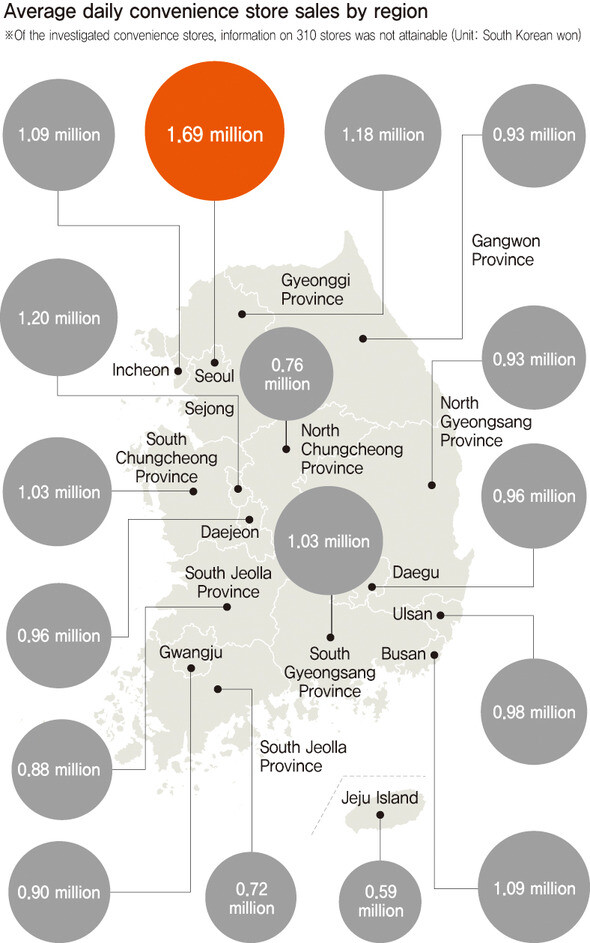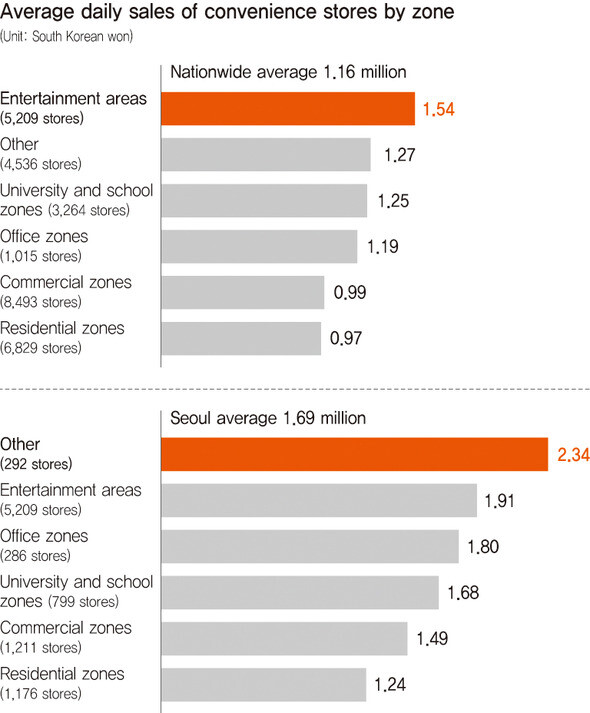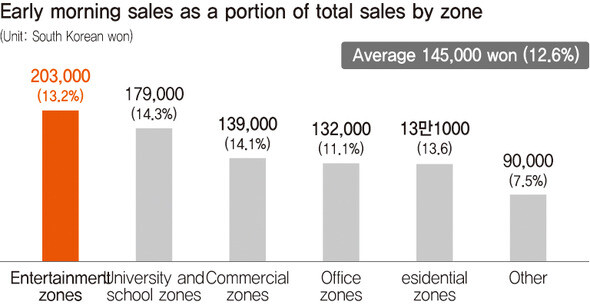hankyoreh
Links to other country sites 다른 나라 사이트 링크
More than half of convenience stores earning less than enough to get by

By Song Kyung-hwa, staff reporter
Over half of South Korean convenience stores are averaging under one million won (US$906) in sales a day, a study has found.
One-quarter of all stores were also found to have average sales under 100,000 won ($90.60) for their overnight shifts.
The Hankyoreh conducted an analysis of average daily sales at convenience stores across the country by region and location based on figures from BC Card. The six different location types showed sales differences of as much as 570,000 won (US$516) per day.
The best sales were in entertainment areas. The 5,209 stores in that category averaged 1.54 million won (US$1,400) a day. Next in line were university and school zones, where 3,264 stores averaged 1.25 million (US$1,130) in daily sales, and office zones, where 1,015 stores sold an average of 1.19 million (US$1,080) worth of goods a day.
But for the biggest category of all, commercial zones, the 8,493 stores averaged just 990,000 won (US$900) a day. The next largest group, the 6,829 stores in residential zones, were tallied at 970,000 won (US$880) in sales.
The average daily take for all stores was 1.16 million won (US$1,050).
According to a Fair Trade Commission (FTC) calculation, sales must average 1.3 million won (US$1,180) a day for the owner to take home 1.99 million won (US$1,800) a month after business expenses - the minimum earnings for a store to stay in business.
Daily sales averages have been released for convenience stores in the past, but huge disparities by neighborhood and region have had prospective proprietors seeking more precise figures.
Overnight shift sales (from midnight to 6 am) averaged 145,000 won (US$130), or 12.63% of all daily sales. Entertainment areas had the highest average with 203,000 won (US$185), while stores in office and residential areas made just over 130,000 won (US$120).

But most residential and office area convenience stores outside Seoul - including those in Jeju Island, North and South Jeolla, and North Chungcheong provinces- were found to be making less than 100,000 won in overnight shift sales. This group accounted for 28 of the 102 region and zone types.
A store earning less than 100,000 won ends up losing money after part-time workers’ wages are subtracted.
Daegu was tallied as having roughly one convenience store for every 2,741 people. The ratios were one per 1,664 people in Gwangju and one per 1,536 people in Seoul.
The number of stores in the country is expected to soon pass 30,000, the most popular type of franchise in the country for small business owners. Convenience stores are drawing complaints about low earnings and unfair practices. The FTC responded by ordering that predicted sales be given in writing and that new stores should not be allowed to open within 250 meters of each other.
Meanwhile, the National Assembly is currently working on amendments to the law that would abolish requirements for 24-hour operation, fueling a further outcry from parent companies.

Please direct questions or comments to [english@hani.co.kr]

Editorial・opinion
![[Column] Has Korea, too, crossed the Rubicon on China? [Column] Has Korea, too, crossed the Rubicon on China?](https://flexible.img.hani.co.kr/flexible/normal/500/300/imgdb/original/2024/0419/9317135153409185.jpg) [Column] Has Korea, too, crossed the Rubicon on China?
[Column] Has Korea, too, crossed the Rubicon on China?![[Correspondent’s column] In Japan’s alliance with US, echoes of its past alliances with UK [Correspondent’s column] In Japan’s alliance with US, echoes of its past alliances with UK](https://flexible.img.hani.co.kr/flexible/normal/500/300/imgdb/original/2024/0419/2317135166563519.jpg) [Correspondent’s column] In Japan’s alliance with US, echoes of its past alliances with UK
[Correspondent’s column] In Japan’s alliance with US, echoes of its past alliances with UK- [Editorial] Does Yoon think the Korean public is wrong?
- [Editorial] As it bolsters its alliance with US, Japan must be accountable for past
- [Guest essay] Amending the Constitution is Yoon’s key to leaving office in public’s good graces
- [Editorial] 10 years on, lessons of Sewol tragedy must never be forgotten
- [Column] A death blow to Korea’s prosecutor politics
- [Correspondent’s column] The US and the end of Japanese pacifism
- [Guest essay] How Korea turned its trainee doctors into monsters
- [Guest essay] As someone who helped forge Seoul-Moscow ties, their status today troubles me
Most viewed articles
- 1[Column] The clock is ticking for Korea’s first lady
- 2After 2 months of delayed, denied medical care, Koreans worry worst may be yet to come
- 3US overtakes China as Korea’s top export market, prompting trade sanction jitters
- 4[Column] Has Korea, too, crossed the Rubicon on China?
- 5[Correspondent’s column] In Japan’s alliance with US, echoes of its past alliances with UK
- 6Hong Se-hwa, voice for tolerance whose memoir of exile touched a chord, dies at 76
- 7[Editorial] When the choice is kids or career, Korea will never overcome birth rate woes
- 8Samsung barricades office as unionized workers strike for better conditions
- 9All eyes on Xiaomi after it pulls off EV that Apple couldn’t
- 10More South Koreans, particularly the young, are leaving their religions